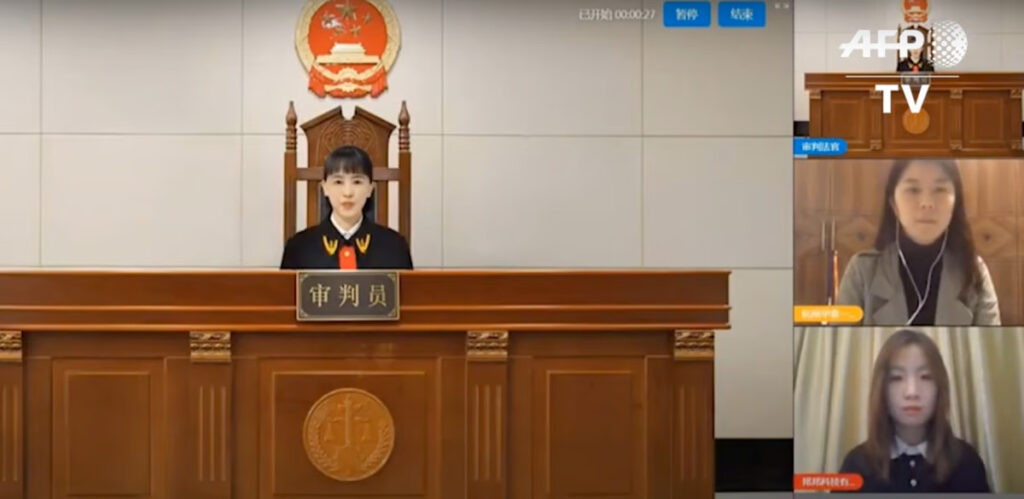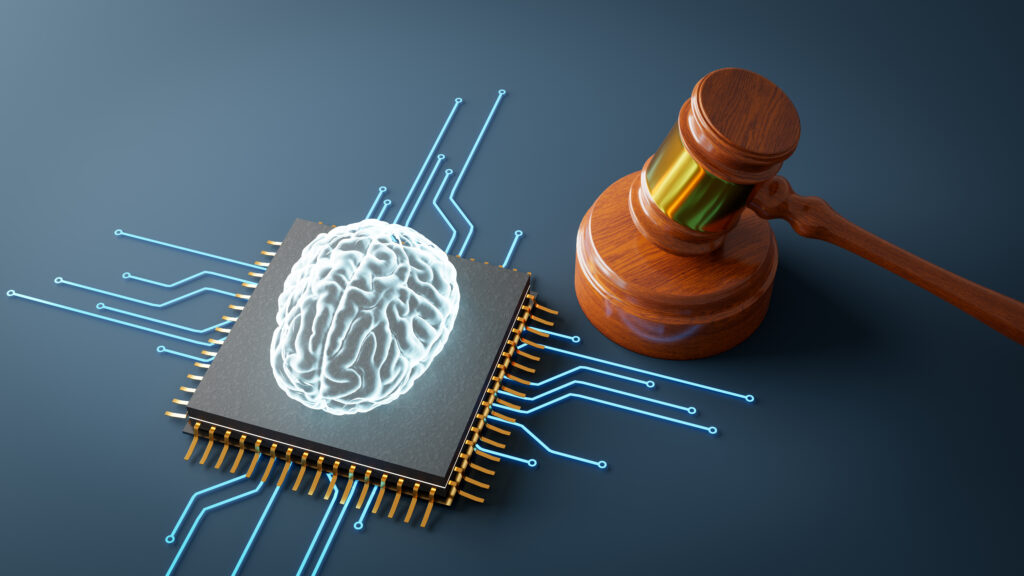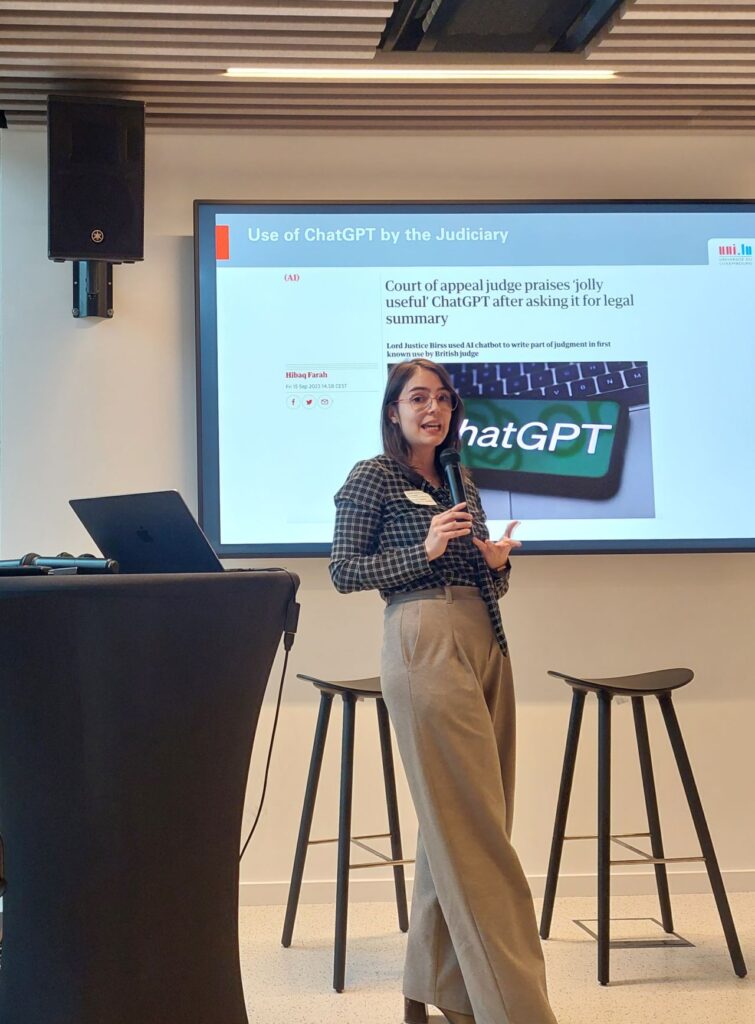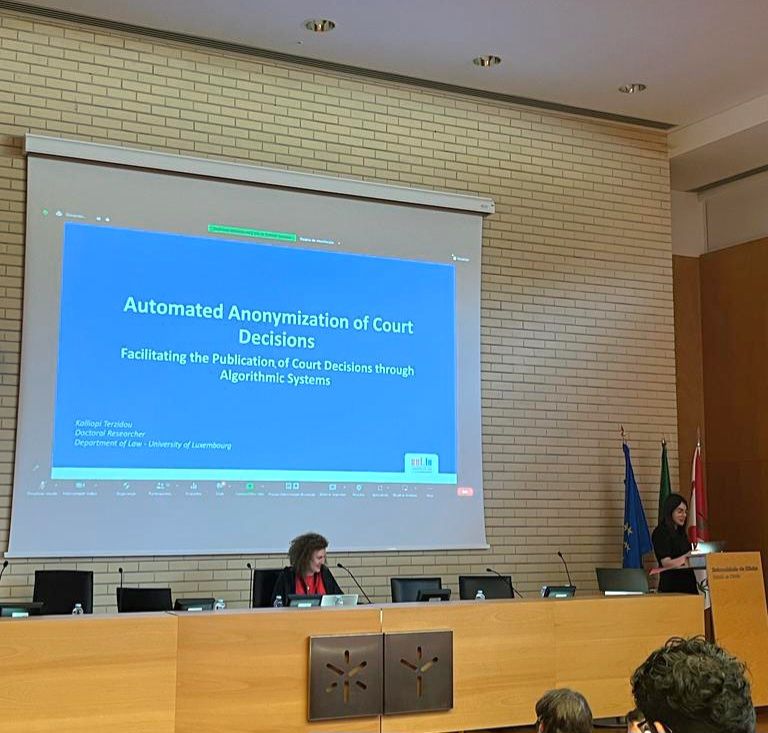BACK TO RESEARCH WITH IMPACT: FNR HIGHLIGHTS
The field of Artificial Intelligence (AI) and Law is increasingly gaining interest due to the introduction of AI applications in our everyday lives, including systems for digital governance. Legal researchers have been examining the use of AI systems by state institutions to process citizens’ information for various purposes, including tax administration, social benefits distribution, and crime control. Research has highlighted the impact of the processing of citizens’ data through AI systems on privacy and personal data protection. However, the automation of the justice sector through AI systems and its effects on access to justice have not received equal attention.

Kalliopi Terzidou, Doctoral Researcher at the Department of Law of University of Luxembourg, examines how AI can help citizens access an independent and impartial justice system.
The scope of her research covers all EU Member States, where rule of law, access to justice, and the right to a fair trial constitute fundamental principles in the respective legal systems. Citizens must be able to stay informed on laws and decisions that affect their rights and obligations and must have an effective opportunity to initiate and participate in court proceedings.

Pseudonymisation of court decisions
AI systems can contribute to access to justice while increasing the efficiency of judicial administrations, as is the case with AI applications for the pseudonymisation of court decisions. The Public Prosecutor’s Office of Luxembourg (Parquet général) has introduced the JUANO application (JUstice-ANOnymization), which assists court clerks in the pseudonymisation of court decisions, so these can be published on the Internet portal of Luxembourgish courts. According to the Public Prosecutor’s Office, the aim of this AI application is to guarantee the homogeneity of the pseudonymisation of court decisions through an optimized process that makes them accessible to lawyers and other interested parties, in compliance with data protection rules.
Access to justice threatened if judges influenced by the recommendations of AI systems
At the same time, AI systems can threaten access to justice when citizens do not have access to an independent and impartial court. This can occur when judges are influenced by the recommendations of AI systems, which can often produce inaccurate or biased outputs. A popular example is the use of ChatGPT by judges when they are deliberating on a case. When judges ask ChatGPT as to what approach they must adopt on the adjudication of a case, they delegate part of their duties to the AI system, therefore compromising their independence from external actors. If judges rely on ChatGPT’s ‘legal advice’ that is unreliable due to, for example, the reference to fictitious legislation or case law, then litigants’ right to a fair trial is at risk.


Examining positive and negative effects
Kalliopi’s research is examining these positive and negative effects of the use of AI systems for judicial administration through different methodologies. Among other, she released a survey to EU Member States’ bodies in charge of judicial administration to collect information on the AI-based digitalisation of national courts. Respondents were also questioned on their perception of the efficiencies and challenges that the use of AI systems by court staff may yield.
This empirical approach aims at combatting the scarcity of information on the internal organisation and functioning of national judicial administrations, including the development and use of AI systems. The principal reason behind this lack of transparency is the protection of the inner functioning of AI systems, so their providers (often private companies) can reap any commercial benefits.
“AI systems are often proprietary models protected under intellectual property law, so access to them by the public is restricted. Court staff, including judges, may also be reluctant to be observed by researchers regarding how they use AI systems. ”Kalliopi Terzidou Doctoral Researcher at the Department of Law of University of Luxembourg

EU’s AI Act placing obligations to providers of AI systems
The findings of the survey will provide Kalliopi with first-hand information that will make easier the examination of AI systems for judicial administration, so as to determine their effects on the principle of access to independent and impartial courts.
Meanwhile, Kalliopi is taking a note of the increasing regulation of the development and deployment of AI systems in the EU. The EU’s AI Act is placing obligations to providers of AI systems, including private companies and judicial institutions. The Act heavily deals with AI systems that can pose a high risk to the fundamental rights of EU citizens, including the right to a fair trial. Generative AI systems, such as ChatGPT, are also targeted under the Act as high-risk AI systems.
According to Kalliopi, the AI Act is bound to affect the adoption of AI systems by the justice sector, so that courts must follow specific technical, organizational, or other types of measures to make a compliant use of AI systems for their judicial administration.
The final output of Kalliopi’s doctoral research has a double goal. On the one hand, it will establish the effects of AI applications for judicial administrations on access to justice. On the other hand, it will determine the way forward for the safe implementation of AI systems in judicial administrations, in compliance with the applicable principles, fundamental rights, and legislative rules under EU law.

Kalliopi Terzidou is a Doctoral Researcher in the Department of Law at the University of Luxembourg, under the supervision of Prof. André Prüm. Her PhD research is part of the FNR PRIDE Doctoral Training Unit (DTU) of DILLAN.
MORE ABOUT KALLIOPI TERZIDOU
On the motivation for her research
“My motivation in pursuing my research topic is to address the systemic delays in the delivery of justice and other bureaucratic hurdles that are experienced by citizens throughout the EU. Having specialized in the field of Law & Digital Technologies, I am intrigued to explore the role that AI can play in making courts more efficient while enhancing the quality of justice.”
What she loves about research
“I am excited to encounter court practitioners, lawyers, and academics of multiple disciplines that provide me with insights on recent trends in the field of AI and Law. I believe that expert insights greatly enhance the validity and reliability of my findings. This is why I strive to enrich my research through the application of empirical approaches, including questionnaires and interviews, the results of which I disseminate through academic papers and conference presentations.”
Why she decided to do her research in Luxembourg
“I decided to carry out my research in Luxembourg primarily because of the quality of its higher education. The University of Luxembourg is known for promoting academic excellence by giving an emphasis on research and innovation. Researchers, including myself, are greatly supported in pursuing their research projects by having access to modern facilities, financial support, and research tools. The multicultural environment of Luxembourg has further encouraged me to expand my horizons through my familiarization with different outlooks on academia and society.”
Related highlights
Spotlight on Young Researchers: Giving robots a more human touch
The use of robots is rising, both in industry and in homes. This is made possible by scientists leveraging artificial…
Read more
Spotlight on Young Researchers: Cancer in older people & the need for a tailored approach
Cancer in adults aged 65+ is increasing, raising pressure on healthcare systems worldwide, creating economic and social burdens for families…
Read more
Spotlight on Young Researchers: A behavioural science approach to financial misconduct
The rapidly evolving risk landscape financial institutions navigate has brought uncertainty and a risk, making them vulnerable to misconduct and…
Read more
Spotlight on Young Researchers: An eco-friendlier approach to plastics
Polyurethanes (PUs) are widely used plastics, produced in large quantities each year, and found in products like foams, coatings, sporting…
Read more
Spotlight on Young Researchers: Adapting Earth technologies to function on the Moon
Over 50 years after the first Moon landing, interest is growing in returning. What was the case in the 1960s…
Read more
Spotlight on Young Researchers: Towards fair health for all
Access to essential health services is considered normal in high-income countries, while they are out of reach for many in…
Read more